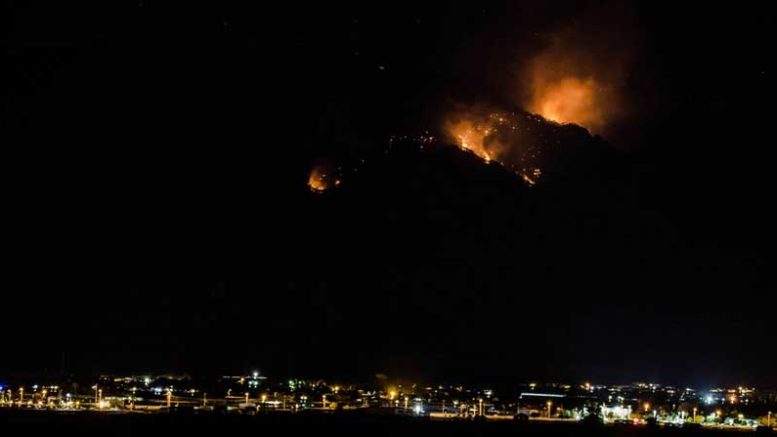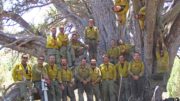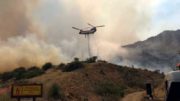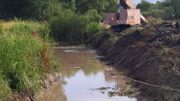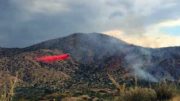Move is a precautionary measure as firefighters make base camp at Columbine
By Jon Johnson
SAFFORD – “This fire is going to go until it rains.” – Tony James, Gila/Las Cruces Type 3 Incident Management Team Operations Section Chief.
In what they deemed as a precautionary measure, representatives from the U.S. Forest Service and the Gila/Las Cruces Type 3 Incident Management Team informed the public that on Tuesday they would likely be closing the top of Mount Graham from where the pavement ends. The information was given as part of an overall assessment of the Frye Fire at a community meeting at the Graham County General Services Building on Monday.
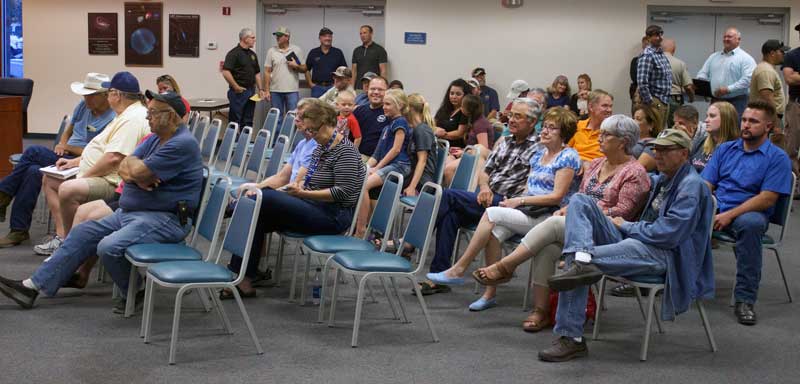
Jon Johnson Photo/Gila Valley Central: Community members gather to receive information about the Frye Fire.
The Frye Fire was started by lightning at about 2:45 p.m. on Wednesday and is burning mostly downed logs and standing dead trees left over from the roughly 30,000-acre Nuttall-Complex Fire in 2004. As of Tuesday evening, the fire has grown to 696 acres as it made its way across Pinnacle Peak, reaching toward Frye Mesa on one side and Ash Canyon on the other.
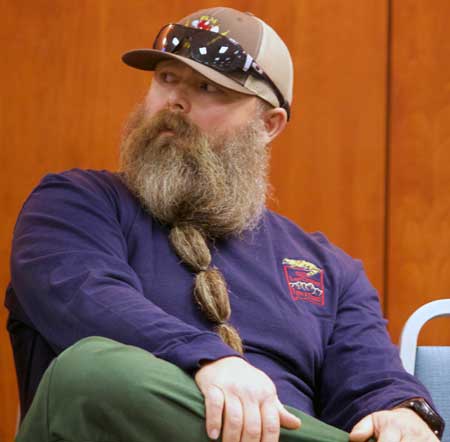
Jon Johnson Photo/Gila Valley Central: Gila/Las Cruces Type 3 Incident Commander Ricky Cox listens attentively during the community meeting. Cox said he was confident his team could keep the Frye Fire in the burn scar of the Nuttall Complex Fire of 2004.
Safford District Assistant Fire Management Officer Scott Glaspie said that while there had been no campground closures of to the point of the Monday night meeting, that situation was about to change.
“We are at that trigger point tonight,” Glaspie said. Ash Creek Falls, Slick Rocks, that’s a trigger point for us to reevaluate and talk about closing the top of the mountain from the end of the pavement all the way to Riggs Lake . . . (We are) encouraging, especially the folks at Old Columbine, that tomorrow is a very prime opportunity to get anything out of those cabins that you guys want to (get.)”
During the roughly hourlong presentation, the representatives went over the history of the Frye Fire (first reported on by Gila Valley Central), how it came to its current situation, what suppression efforts are taking place and what the future of the fire may likely hold. Throughout the presentation they stressed that firefighter safety was paramount to some of the early decisions on how to fight the fire with the resources they had.
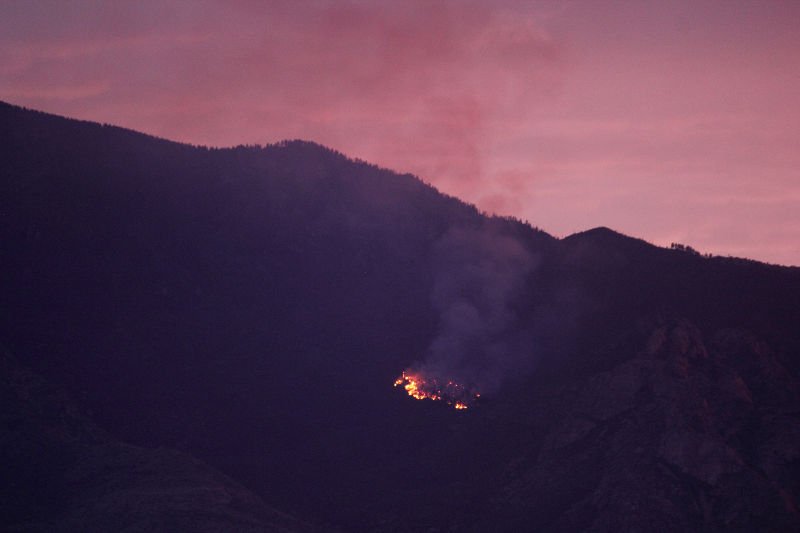
Eric Burk Photo/Gila Valley Central: As fading thunderstorms create a dramatic sunset, the lightning-caused Frye Fire burns on Mount Graham in this image taken Wednesday, June 7.
Graham County Supervisor Paul David was in attendance and after lauding the firefighters for their efforts, questioned why more wasn’t done when the fire first started by lightning Wednesday afternoon.
“It looks like something maybe a tanker could have put out with a single drop has now grown and not only in what the old fire has burned but now into new areas that haven’t been burned . . .” David said. “It’s frustrating to watch it go from a small fire to taking a good portion of the mountain top . . .”
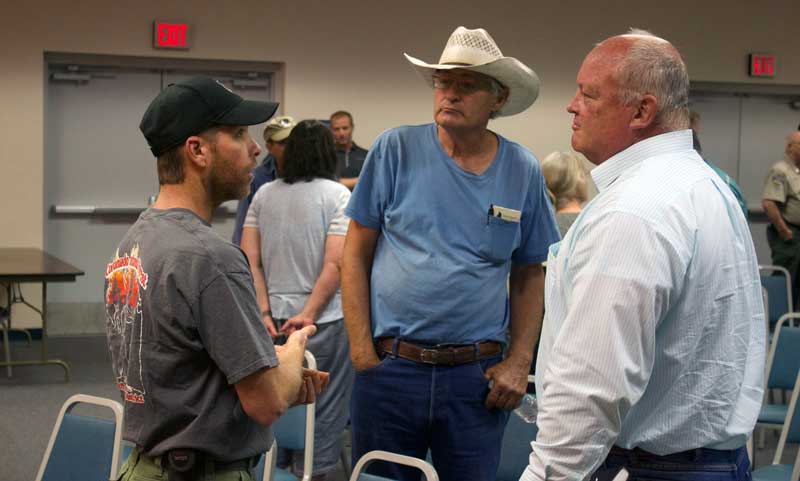
Jon Johnson Photo/Gila Valley Central: Safford District Assistant Fire Management Officer Scott Glaspie, left, speaks with rancher Harold Lackner, center, and Graham County Supervisor Paul David after the community meeting.
Safford District Fire Management Officer Everett Phillips reiterated that due to 15 fire starts the same day, there were no resources but what his 8-person crew had at the time, and the fire was burning in a difficult area to reach through treacherous terrain with multiple dangers from previous fires. Additionally, the fire wasn’t high enough on the priority list to allow air support, which was busy protecting assets at other fires, such as homes in the Lizard Fire. To date, no structures are in danger from the Frye Fire, and it is mostly been a beneficial burn by removing dead waste from the mountain that otherwise would not be allowed to be removed. However, Phillips said the fire is burning in such a way that they could still be dealing with parts of it into August.
“You can put this on me,” Phillips said. “My decision was to not put those guys on the side of the hill because I knew eight folks were not going to pick up a 5-acre, 10-acre fire. The air resources were not available. We asked, (but) they had other fires going that were threatening the community of Dragoon (and) they were running all their air tankers down there . . . Not being able to have that resource, it goes back to me that I’m not willing to risk somebody’s life on the side of the hill.”
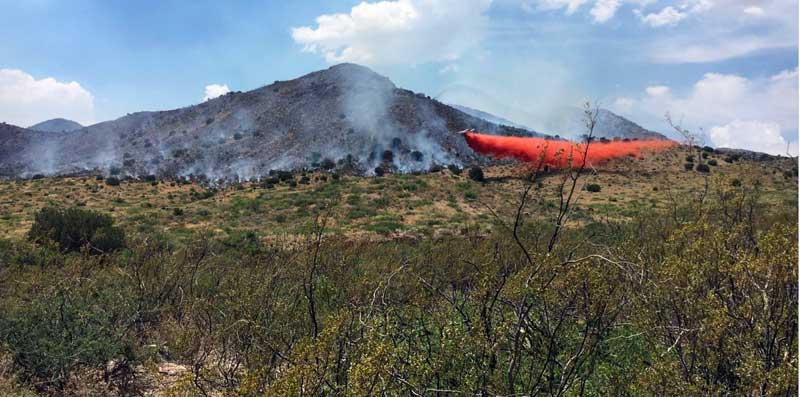
Contributed Photo/Courtesy U.S. Forest Service. Air support, such as this slurry drop over the Bowie Fire, was not available to fight the Frye Fire.
Glaspie also pointed out that they had aggressively fought other fires in the same area since the Nuttall Complex Fire to great peril.
“In one of those, two of the individuals who work in this district almost did not come back,” Glaspie said. “One of those trees fell down (and) they had to lay down underneath the logs and have that tree slide over the top of their heads.”
Suppression Efforts
In its indirect fire fighting effort, the numerous crews on the mountain have been busy rebuilding fire lines established by the Nuttall Complex Fire to ultimately stop the blaze before it reaches the cabins at Columbine or the Mount Graham International Observatory. The firefighters have established roughly eight miles of fire lines at the top perimeter and even more down the eastern side near private property to help stop the fire from spreading down to ranches.
The strategy, according to Glaspie, is to stay in front of the fire and keep it boxed in to the Nuttall Complex Fire burn scar.
“There’s been a lot done,” Glaspie said.
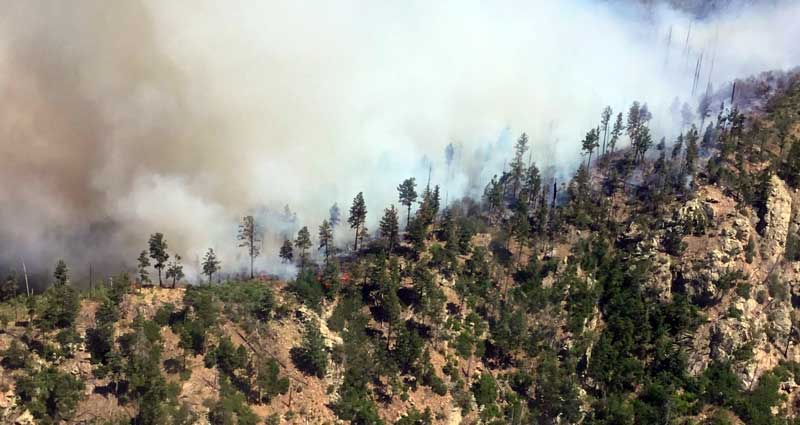
Contributed Photo/Courtesy U.S. Forest Service: This aerial photo shows some of the terrain and fuels being burned in the Frye Fire.
James reiterated that the fire is doing a lot of good by cleaning up the dead trees and downed logs from the Nuttall Complex Fire and said he feels confident that the strategy of waiting for the fire to reach the fire lines will work.
“We’ve prepped way ahead,” James said. “We don’t want to get people hurt, so we’re going to let (the) fire kind of come to us and we’re going to be well prepared for when it does come to us.”
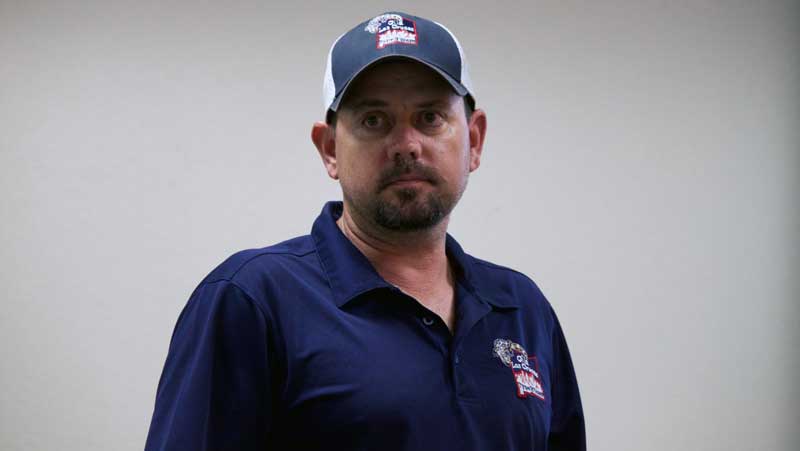
Jon Johnson Photo/Gila Valley Central: Gila/Las Cruces Type 3 Incident Management Team Operations Section Chief Tony James advises those in attendance about the fire suppression effort.
Columbine cabin owner and Pima Fire Department volunteer firefighter Daryl Weech views the suppression strategy as beneficial to the mountain.
“Until they do something with the Endangered Species Act, we’re going to continue to have these (fires) because they don’t let them thin the mountain up manually because of the squirrel,” Weech said.
The Mount Graham red squirrel is an endangered subspecies of the American red squirrel native to the Pinaleno Mountains.
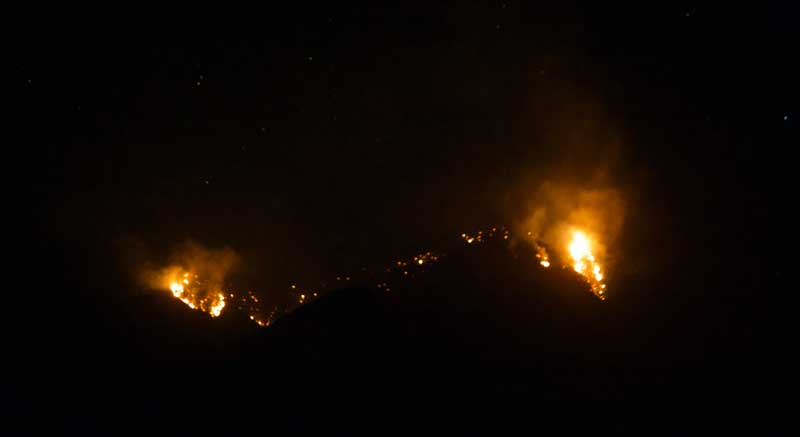
Jon Johnson Photo/Gila Valley Central: The Frye Fire has grown into Ash Canyon faster than expected and conversely has not grown into Frye Mesa yet as expected.
Gila/Las Cruces Type 3 Incident Commander Ricky Cox also battled the Nuttall Complex Fire and said the fuels for the Frye Fire are different, resulting in a fire that is not as severe. He said he felt confident his team and all the hard-working firefighters would be able to keep the fire in the previous fire’s burn scar.
“We’re small but I consider us mighty,” Cox said. “I come with a very highly specialized set of folks . . . Mount Graham is a challenge, there’s no doubt about it.”

